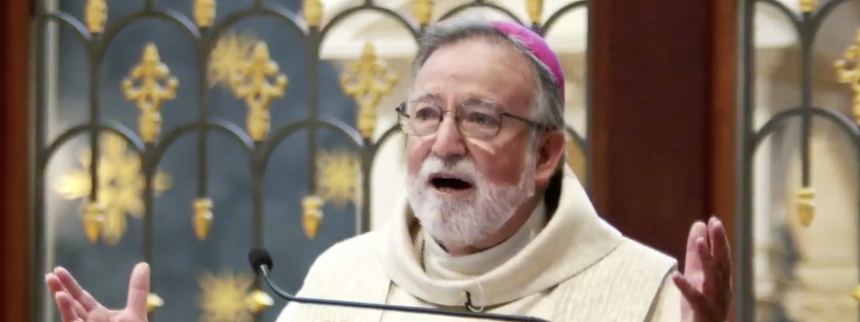
The following homily was delivered by Bishop Jaime Soto on Easter Sunday, April 17, 2022 at the Cathedral of the Blessed Sacrament in downtown Sacramento.
In the gospel account from Luke, the women, who came to anoint the dead body of Jesus, found the stone rolled back and the tomb empty. This unexpected discovery left them perplexed and confused. In that moment of anxiety, angels appeared to them and reminded them of what Jesus had previously told him about his suffering and death. “Remember what he said to you while he was still in Galilee, that the Son of Man must be handed over to sinners and be crucified, and rise on the third day.”
More than the appearance of angels, it was sweet memory of the Lord’s voice speaking about his suffering, death, and resurrection that revived their aching hearts. Remembering what the Lord had said to them gave them a new horizon. They could see beyond the cruel savagery of those who rejected and condemned Jesus to a humiliating death by crucifixion. These horrifying events were seen not from the vain and vicious perspective of those who deplored the preacher from Galilee. Their dark deeds faded in the light of God’s powerful providence. The women saw the truth coming to light, like the daybreak of a new creation. The resolute poetic beauty of psalm 118 resounded in their hearts when they remembered what the Lord had taught them, “The stone the builders rejected has become the cornerstone. By the LORD has this been done; it is wonderful in our eyes. This is the day the LORD has made; let us rejoice in it and be glad.” (Ps. 188. 22-24)
The risen Jesus was the cornerstone, the daybreak of an unimaginable new creation. They were the witnesses of this new creation stirring in that daybreak on the first day of the week, the first day of a new creation story. On them shone the light of a sun that would never set. At that moment they still had not seen him but by remembering, the words of the risen Jesus were already burning in the hearts of those women, Mary Magdalene, Joanna, and Mary, the mother of James.
This sacred memory, recounted in the resurrection accounts, is also what unites us to the joy of that first Easter Sunday. We too can remember what Jesus has taught us. We can let the gentle voice of the Good Shepherd lead us from death to life, from fear to hope, from despair to unending amazement at what the Lord has done. Let our eyes gaze on the wonder of God because this is the day the Lord has made; let us rejoice in it and be glad.
Remembering is not nostalgia, lingering in the past. Remembering the Lord meant that the disciples were familiar with the Lord. They knew the voice and manners of Jesus so they could more readily recognize the Risen Lord as he appeared to him following the resurrection. That is why those that did not know him nor follow him could not see him risen from the dead.
Simon Peter spoke to this in the Acts of the Apostles when he said, “This man God raised (on) the third day and granted that he be visible, not to all the people, but to us, the witnesses chosen by God in advance, who ate and drank with him after he rose from the dead.” (Acts 10.40-41) The Apostle’s words spoke of the mystery of the Eucharist, witnessed by chosen ones before the Lord’s death. These few chosen ones continued to remember him as they broke the bread of life and shared the cup of salvation fulfilling the Lord’s timeless command to “Do this in memory of me.”
St. Paul told the Romans, “If we have grown into union with him through a death like his, we shall also be united with him in the resurrection. The courage and desire to be in union with Christ through a death like his only comes from remembering the Good Shepherd who gave his life for his sheep through a life of humility and charity culminating with his sacrifice on the cross as the obedient son of the Father. Truly remembering asks us to imitate the humility and charity with which he loved us as his friends. We remember this in every Eucharist. By remembering we are present to him, we sit with him at the table of the Last Supper and stand under him as he hung upon the cross.
This gives our own lives a new orientation, a new direction. We see beyond the dismal darkness and tribulations of our days to the daybreak of a new creation. We are no longer defined by the powers that threaten us or the many calamities that worry us. Life is no longer an empty tomb that confounds us but a daybreak that awakens us to the newness of life found in the divine mercy of Jesus Christ, now and forever.

